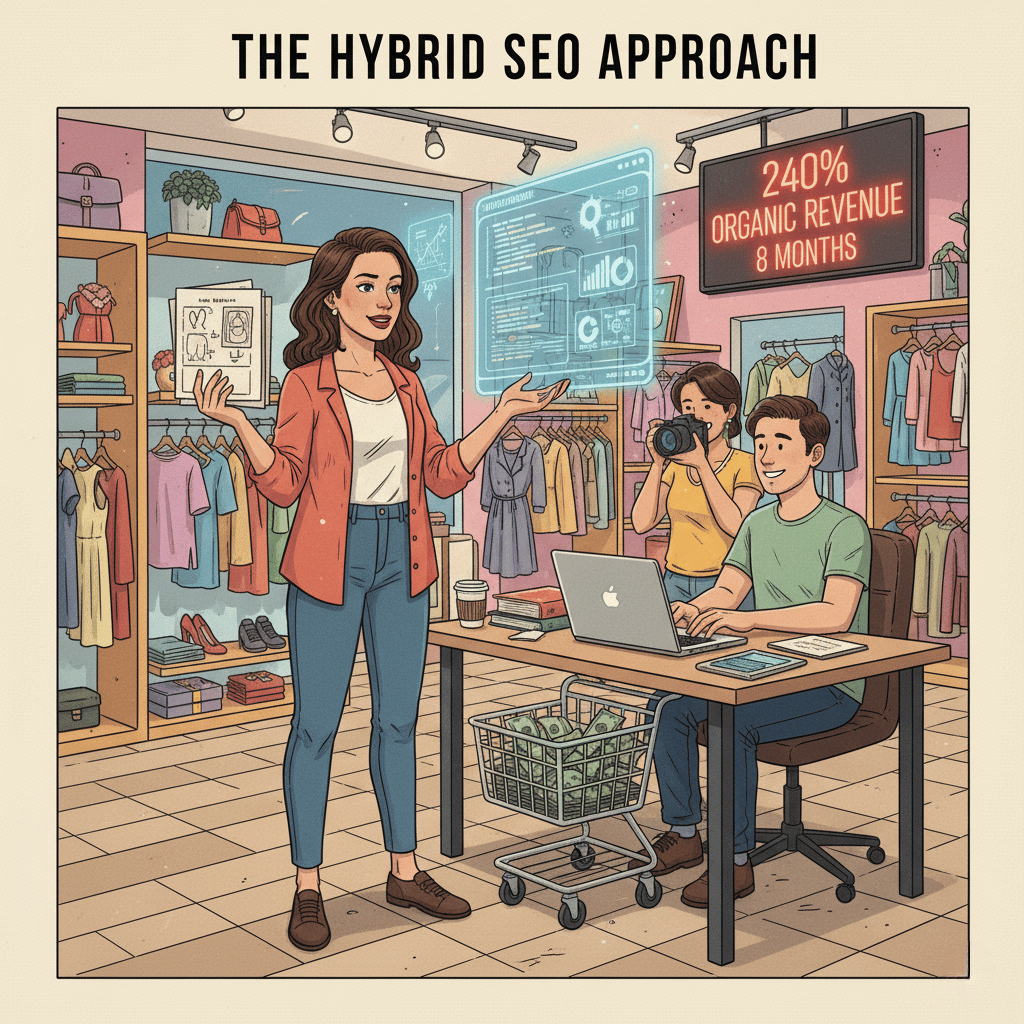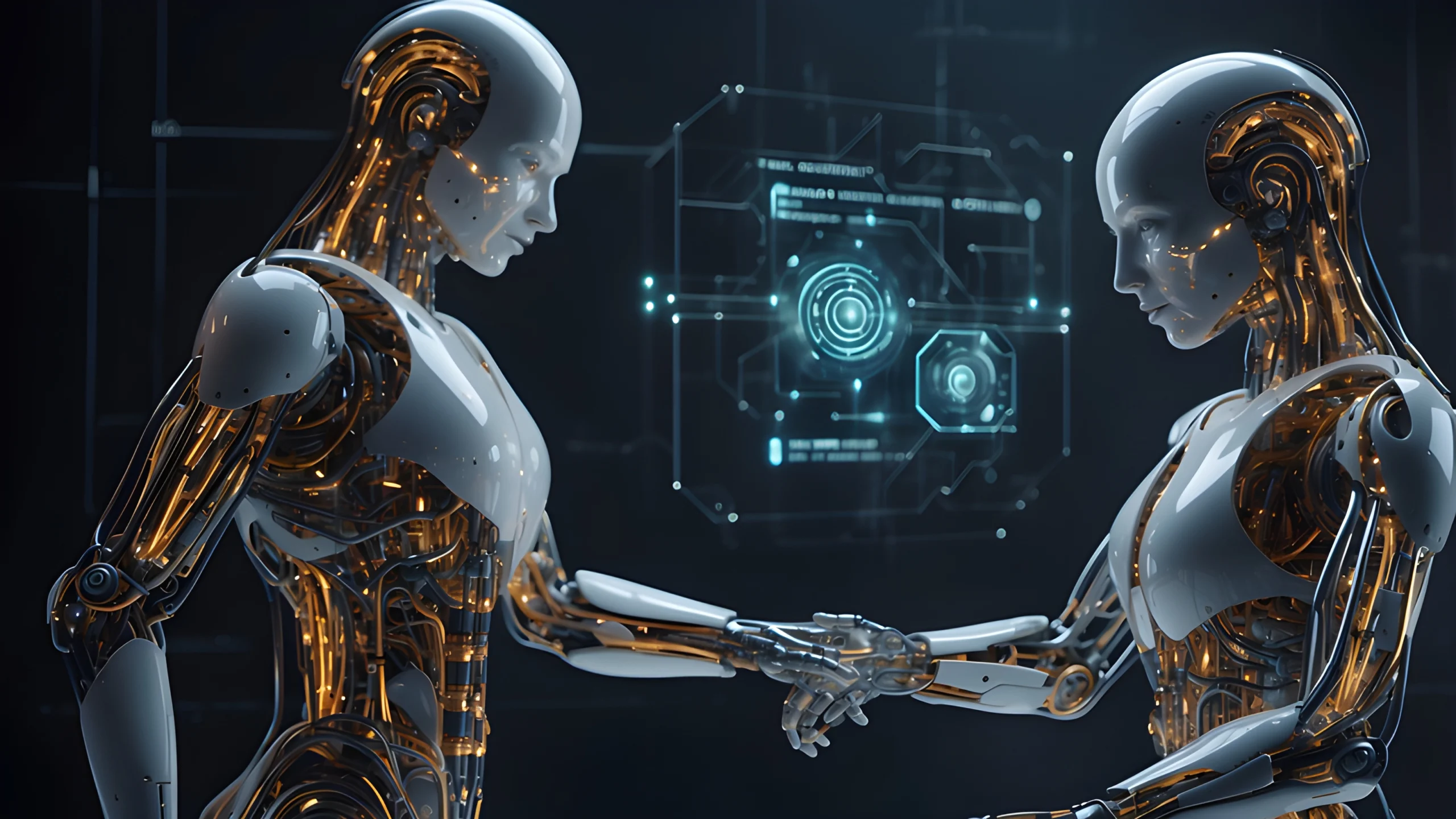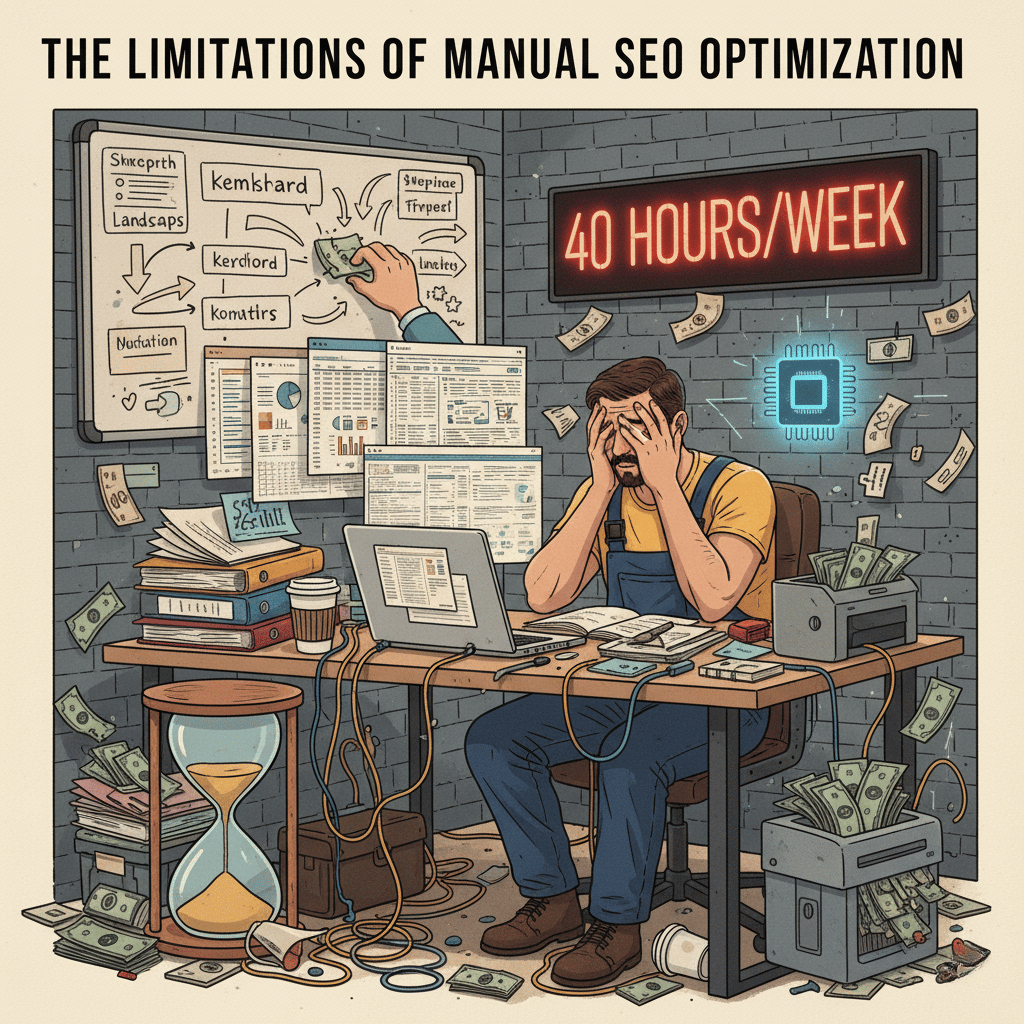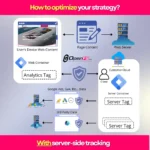What Makes AI SEO Different From Traditional SEO Methods?
The short answer? AI SEO uses machine learning algorithms to automate and enhance optimization tasks at scale, while traditional SEO relies on manual expertise and human strategic thinking. But here’s the thing—neither approach is inherently “better.” It’s like asking whether a hammer is better than a screwdriver. They’re different tools for different jobs, and the smartest marketers I know are using both.
Let me share something that happened just last week. A plumbing company owner in Newark called me, frustrated beyond belief. He’d spent months doing everything the “SEO experts” told him—keyword research, content creation, link building—but his website was still buried on page three of Google. Sound familiar? What he didn’t realize was that his competitors were already leveraging AI-powered optimization tools to outmaneuver his traditional approach. But here’s the kicker: when we dug deeper, we found that pure AI solutions weren’t the answer either. His success came from combining both approaches strategically.
Traditional SEO Methods: The Foundation That Still Matters
You know what? I’ve been in this game since before “Google it” became a verb, and I can tell you that traditional SEO isn’t going anywhere. It’s the bedrock of everything we do online, and honestly, if you don’t understand these fundamentals, no fancy AI tool is gonna save you.
Traditional search engine optimization revolves around three main pillars: on-page optimization (your content and HTML), off-page optimization (primarily link building), and technical SEO (site structure and performance). These aren’t just checkboxes to tick off—they’re the language search engines understand. When I work with businesses on their comprehensive SEO strategy, we always start here because it’s what actually moves the needle.
Why Human Expertise in SEO Can’t Be Replaced
Here’s something AI can’t do yet—understand the quirks of your local market. Last month, I worked with a bakery in Hoboken that was struggling to rank. All the AI tools in the world couldn’t tell them that their customers searched for “crumb cake” instead of “coffee cake” or that mentioning their proximity to the PATH station mattered more than having perfect keyword density. That’s the human touch—understanding context, culture, and those little nuances that make all the difference.
Traditional SEO professionals bring something else to the table: relationship building. I’ve watched businesses transform their online presence not through algorithm hacks but through genuine connections. When you’re featured in the local newspaper or partnering with community organizations, those authentic backlinks carry weight that no AI-generated link scheme can match. Plus, there’s accountability—when you work with real people, you know exactly who’s responsible for your results.
The Limitations of Manual SEO Optimization
But let’s be real here—traditional SEO has its downsides. Remember that plumber I mentioned? Part of his frustration came from the sheer time investment required. Manually analyzing competitors, researching keywords, and creating content takes forever. By the time you’ve optimized for one set of keywords, the search landscape has already shifted.
I’ve seen businesses burn through budgets trying to keep up manually. One e-commerce client was spending 40 hours a week just on keyword research and competitor analysis. That’s a full-time job! And here’s the brutal truth: humans make mistakes. We miss opportunities, overlook technical issues, and sometimes our biases lead us down the wrong path. That’s where AI starts looking pretty attractive.
How AI Is Transforming Search Engine Optimization
Okay, so let’s talk about the elephant in the room—AI SEO tools are absolutely crushing it right now. And I mean that in the best way possible. These aren’t just fancy calculators; they’re sophisticated systems that can process more data in an hour than I could analyze in a month.
What really gets me excited about AI-powered SEO is its ability to spot patterns humans would never catch. Last quarter, we used machine learning algorithms to analyze a client’s site—a roofing company in Bergen County. The AI discovered that pages mentioning specific neighborhoods outperformed generic location pages by 312%. We’d never have found that pattern manually across thousands of pages.
Machine Learning SEO: Speed Meets Intelligence
The speed of AI optimization is honestly mind-blowing. What used to take weeks now happens in minutes. Here’s a real example: We recently audited a medical practice’s website with over 500 pages. Traditional approach? That’s at least two weeks of work. With AI? Complete technical audit, content gaps analysis, and optimization recommendations in under four hours.
- Instant identification of crawl errors and broken links
- Real-time content optimization suggestions
- Automated schema markup implementation
- Predictive keyword trend analysis
- Competitor gap analysis at scale
But here’s what really matters—AI doesn’t just work faster; it works smarter. These tools learn from millions of data points, constantly refining their recommendations based on what actually works. It’s like having a thousand SEO experts working around the clock, except they never need coffee breaks.
Where Artificial Intelligence SEO Falls Short
Now, before you rush out and fire your SEO team, let me pump the brakes a bit. AI has some serious blind spots. Remember that bakery I mentioned? An AI tool recommended they target “artisanal bread NYC” because of high search volume. Sounds logical, right? Wrong. Their customers were locals who already knew they were in Hoboken—they searched for “best cannoli near me” or “birthday cakes Hoboken delivery.”
AI also struggles with brand voice and emotional connection. I’ve seen AI-generated content that’s technically perfect—keywords in all the right places, perfect structure, optimal length—but it reads like a robot wrote it (because, well, it did). Your customers aren’t robots. They want to feel something when they read your content, and that’s where human creativity becomes irreplaceable.
AI SEO vs Traditional SEO: Performance Comparison and Real Results
Let’s get down to brass tacks with some actual numbers. I tracked two similar law firms over six months—one using primarily traditional SEO, the other heavily leveraging AI tools. The results? Both saw improvements, but in completely different areas.
The traditional SEO firm saw a 67% increase in domain authority through strategic link building and relationship development. Their conversion rate jumped 43% because every piece of content was crafted to address specific client concerns. The AI-powered firm? They published 5x more content, identified and fixed 200+ technical issues, and increased organic traffic by 180%. But here’s the plot twist—their conversion rate only improved by 12%.
Cost Analysis: Investment vs Returns
Money talks, so let’s talk money. Traditional SEO services typically run $2,000-$10,000 per month for small to medium businesses. You’re paying for expertise, time, and personalized attention. AI SEO tools? Most range from $99-$500 monthly, but—and this is crucial—you still need someone who knows what they’re doing to manage them.
Here’s a breakdown from my experience:
- Traditional SEO Only: Higher upfront cost, slower initial results, but stronger long-term brand building
- AI SEO Only: Lower cost, faster implementation, but often lacks strategic depth
- Hybrid Approach: Moderate cost, faster results with strategic depth, best overall ROI
One client, a dental practice in Princeton, switched from pure traditional SEO ($4,000/month) to a hybrid model ($2,500/month). They saw better results at 40% less cost. That’s the sweet spot most businesses are looking for.
Scalability and Future-Proofing Your SEO Strategy
If you’re planning to scale, AI becomes almost essential. Traditional SEO hits a wall when you’re dealing with thousands of pages or multiple locations. I watched a franchise restaurant chain struggle for months trying to optimize 50 location pages manually. Once they integrated AI tools, they optimized all 50 in a weekend and expanded to 100 locations within three months.
But scalability isn’t just about size—it’s about adaptability. Google’s algorithm changes constantly (we’re talking hundreds of updates yearly), and AI systems adapt in real-time. They’re analyzing patterns across millions of websites, spotting algorithm shifts before they’re even announced. Traditional SEO pros need time to study, test, and adjust. By then, you might’ve already lost rankings.
The Hybrid SEO Approach: Getting the Best of Both Worlds
Here’s my honest take after years in the trenches: the “AI vs traditional” debate is missing the point entirely. It’s not about choosing sides—it’s about leveraging both intelligently. The businesses crushing it right now? They’re using AI for the heavy lifting and human expertise for strategy and creativity.
Take Sarah’s boutique (name changed for privacy), a small fashion retailer in Morristown. We implemented a hybrid approach that transformed her business. AI tools handle her product descriptions, technical monitoring, and keyword research. Meanwhile, her team focuses on creating engaging blog content, building influencer relationships, and crafting email campaigns that actually convert. Result? 240% increase in organic revenue in eight months.

Implementation Strategy for Modern SEO Success
Want to implement a hybrid approach? Start small. Pick one area where you’re struggling—maybe it’s keyword research or technical audits—and test an AI tool there. Don’t go all-in immediately. I’ve seen too many businesses buy every AI tool available and end up overwhelmed and confused.
Here’s my recommended implementation path:
- Month 1-2: Establish baseline metrics and identify biggest pain points
- Month 3-4: Introduce AI tools for data-heavy tasks (audits, keyword research)
- Month 5-6: Integrate AI content assistance while maintaining human editing
- Month 7+: Refine the balance based on actual results
The key is maintaining human oversight. AI might suggest targeting a keyword, but you need to ask: Does this make sense for my business? Will my customers actually search for this? That’s where your expertise or your SEO partner’s knowledge becomes invaluable.
Measuring Success: KPIs That Actually Matter
Forget vanity metrics. I don’t care if you’re ranking #1 for a thousand keywords if none of them bring paying customers. When evaluating your hybrid SEO approach, focus on metrics that impact your bottom line.
Track your organic conversion rate religiously. If AI helps you get more traffic but conversions drop, something’s wrong. Monitor your cost per acquisition—are you spending less to get each customer? Check your customer lifetime value from organic search. These visitors often become your best customers because they found you while actively searching for solutions.
We help clients set up proper tracking through our conversion optimization services, because what’s the point of traffic if it doesn’t convert? One HVAC company was thrilled with their traffic increase until we showed them their cost per lead had actually increased. We adjusted the strategy, focusing on high-intent keywords identified by AI but refined by human insight, and cut their cost per lead by 58%.
Making the Right Choice for Your Business
So, is AI SEO better than traditional SEO? After everything we’ve covered, you probably realize that’s the wrong question. The right question is: How can I use both approaches to dominate my market?
If you’re a local service business, lean heavier on traditional SEO with AI support for technical tasks. If you’re an e-commerce site with thousands of products, AI becomes essential, but you still need human strategy for brand differentiation. The beauty is, you don’t have to figure this out alone. Whether you need help with developing your SEO strategy or want to explore the best AI SEO tools for 2025, the key is starting somewhere and adjusting based on results.
The businesses winning in 2025 aren’t choosing between AI and traditional SEO—they’re strategically combining both. They’re using AI’s processing power to handle data-heavy tasks while leveraging human creativity and strategic thinking for the aspects that truly differentiate their brand. And honestly? That’s exactly where you want to be.
Frequently Asked Questions
Can AI completely replace human SEO experts?
Nope, and it probably won’t anytime soon. While AI excels at processing data and identifying patterns, it can’t replicate human creativity, strategic thinking, or understanding of local market nuances. The most successful businesses use AI as a powerful tool while keeping humans in the driver’s seat for strategy and relationship building.
How much should I budget for AI SEO tools vs traditional SEO services?
A solid hybrid approach typically costs 30-50% less than pure traditional SEO services. Expect to invest $150-500 monthly in AI tools, plus $1,500-3,000 for human expertise to manage strategy and implementation. This combination often delivers better ROI than either approach alone.
What’s the biggest mistake businesses make when implementing AI SEO?
Going all-in without proper oversight. I’ve seen companies generate hundreds of AI-written pages that tank their rankings because the content lacks depth and authenticity. AI is a tool, not a magic solution—you need human judgment to ensure outputs align with your brand and actually serve your customers.
How long before I see results from a hybrid SEO approach?
You’ll typically see initial improvements within 4-6 weeks, especially in technical areas and content optimization. Significant traffic and ranking improvements usually appear around the 3-4 month mark, with substantial ROI becoming clear by month six. The combination of AI efficiency and human strategy tends to deliver results faster than traditional methods alone.
Which AI SEO tools are actually worth the investment for small businesses?
Start with tools that address your biggest pain points. For most small businesses, I recommend beginning with an all-in-one platform for technical audits and keyword research, then adding specialized tools as needed. The key isn’t having every tool—it’s using the right ones effectively with proper human oversight.
 Written by: Romulo Vargas Betancourt
Written by: Romulo Vargas Betancourt
CEO – OpenFS LLC








